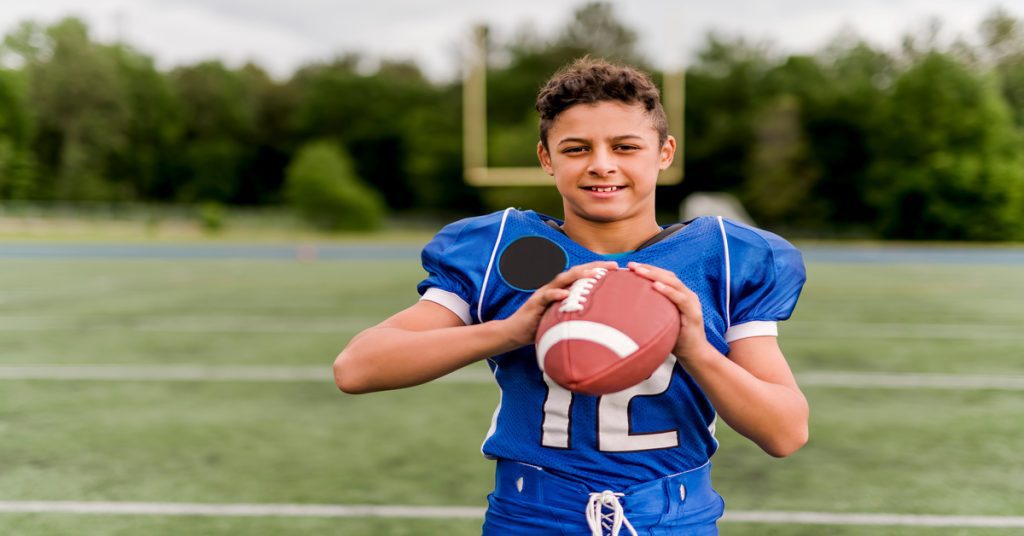Every young quarterback dreams of throwing the perfect spiral that hits the receiver right in the hands. Achieving that level of accuracy, however, takes more than just a strong arm; it requires precision, practice, and proper technique. This guide provides ten practical tips to help your child develop the skills necessary to become a more accurate and confident quarterback. By focusing on these key areas, your young athlete can sharpen their abilities and make a significant impact on the field.
Master Proper Grip Techniques
A consistent and correct grip is the foundation of an accurate throw. Your child should hold the football with their fingertips, not their palm, to gain better control. The fingers should be spread comfortably over the laces, with the index finger typically positioned near the tip of the ball for guidance. Having a firm but relaxed grip allows for a clean release and a tight spiral, which are critical for accuracy.
Develop Consistent Footwork Drills
A quarterback’s power and accuracy come from the ground up. Correct footwork aligns the body and creates the rotational force needed for a strong throw. Your child should practice a consistent three-step or five-step drop, depending on the play. Drills that focus on keeping a wide, stable base and pointing the front foot toward the target will help build muscle memory for proper throwing mechanics.
Practice Visualizing the Throw
The mental aspect of the game is just as important as the physical one. Before each throw, encourage your child to visualize the ball leaving their hand and hitting the receiver perfectly. This mental rehearsal helps train the brain to execute the physical motions required for an accurate pass. Top athletes in many sports use visualization to prepare for competition, and it can be a powerful tool for a young quarterback.
Strengthen Core Muscles
A strong core provides the stability needed to transfer power from the lower body to the upper body during a throw. Exercises like planks, Russian twists, and medicine ball throws will build the abdominal and lower back muscles. A stronger core helps a quarterback maintain balance while rotating their torso, leading to more controlled and accurate passes.
Practice With a Stationary Target
Improving accuracy requires repetition. Have your child practice throwing at a stationary target, such as a net with a pocket or a specific spot on a wall. This practice eliminates the variable of a moving receiver, allowing them to focus solely on their mechanics and release point. Start at a short distance and gradually increase the range as their consistency improves.
Analyze Film To Identify Flaws
Watching game or practice film is an invaluable tool for improvement. Sit down with your child and review their throws frame by frame. Look for inconsistencies in their footwork, arm motion, or release. Seeing their own performance can help them understand what they are doing right and where they need to make adjustments.
Seek Expert Coaching
A knowledgeable coach can provide personalized feedback that your child might not see on their own. A good quarterback coach can identify subtle flaws in technique and offer specific drills to correct them. Their expertise can accelerate your child’s development and help them build a solid foundation of skills.
Simulate Game Situations
Practice should mimic the pressures of a real game. A sports simulator will improve football skills by recreating game-like scenarios, forcing your child to make quick decisions and accurate throws while under pressure. If you do not have access to a simulator, you can create drills that involve moving pockets or simulated pass rushers to help them get used to throwing in less-than-ideal conditions.
Focus on Mental Preparation
Confidence plays a huge role in a quarterback’s performance. Your child needs to trust their training and believe in their ability to make the throw. Teach them breathing exercises or other relaxation techniques to stay calm under pressure. A mentally prepared quarterback is less likely to let one bad pass affect their entire game.
By focusing on these ten tips, your young quarterback can build the skills and confidence needed to excel on the field. Consistent practice and a commitment to refining their technique will pave the way for greater accuracy and a deeper enjoyment of the game.






